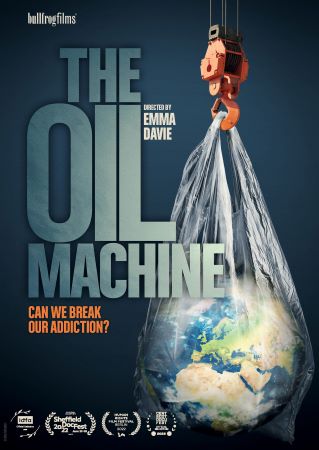
The Oil Machine 2023
Distributed by Bullfrog Films, PO Box 149, Oley, PA 19547; 800-543-FROG (3764)
Produced by Sonja Henrici, David Harron, Mark Thomas, James Marriott, and Terry Macalister
Directed by Emma Davie
Streaming, 81 mins
College - General Adult
Business; Climatic Changes
Date Entered: 05/03/2024
Reviewed by Abbey B. Lewis, STEM Engagement Librarian, University of Colorado BoulderSince the 1960s, billions of barrels of oil have been extracted from the North Sea. Oil production continues to flourish throughout the region even years after the Paris Agreement called for the cessation of new fossil fuel resources. Stopping oil production itself would without a doubt shift the world towards a more sustainable future, but both government and industry lag behind in making the necessary changes to support this shift. The Oil Machine explores the myriad ways in which North Sea oil production has entrenched itself in the United Kingdom’s economy, responsible for jobs and retirement funds, as well as for pollution, disease, and a rapidly changing climate.
The film presents a more complex picture of our current entanglements than just that the oil industry is harmful to the environment. Through interviews with oil industry executives, investors, activists, scientists, and oil workers, viewers can see that a shift away from fossil fuels requires more than just alternative energy sources. A thriving oil industry has provided the UK with jobs, a prosperous stock exchange, and secure pension funds. As the oil executives in the film point out, stopping production jeopardizes all of that. However, the young activists in the film continually raise a question that the industry ignores: What does the economic stability of today matter, if food, health care, and shelter are impossible to have in the future due to climate change? While audiences may find themselves grudgingly ceding a few points to industry, the clear and terrifying arguments made by these children are incontestable. In the face of impending climate catastrophe, anything the executives might say to justify their business practices ultimately feels flat and disingenuous.
If the world is going to make progress towards stopping climate change, then that means working with economic concerns, as well as scientific ones. As Steve Weygood, the founder of Aviva Investors’ Global Responsible Investment team, suggests, a greater understanding of business is also necessary for stopping climate change. This applies not only to knowing where and how one’s money might be invested in oil companies, but also to the taxes, insurance, and other financial entanglements that all operate within the larger oil machine. The film is bleak but does offer hope and solutions. Tessa Khan, an environmental lawyer, points to the unexpected success of the renewable energy sector that could conceivably expand to a point where it’s able to meet the world’s needs much more rapidly than the oil industry once did. The problem isn’t so much that our world is entangled in a machine, it’s that we’re entangled in the wrong one.
The Oil Machine is highly recommended for academic library collections. This film would be just as useful and thought-provoking in classes covering business or economics as it would be in those covering environmental sciences. More importantly, there’s wisdom here that can help students envision what a climate-friendly future will need to look like, especially in realms they might not have previously considered.
Awards:Green Doc Award, Pordenone Docs Fest, Italy
Published and licensed under the Creative Commons Attribution 4.0 license. Anyone can use these reviews, so long as they comply with the terms of the license.